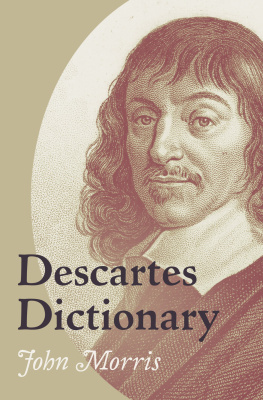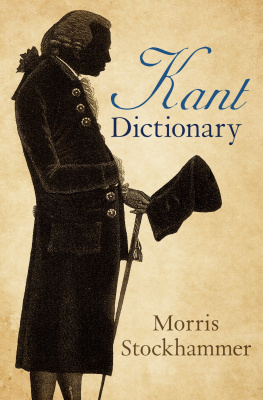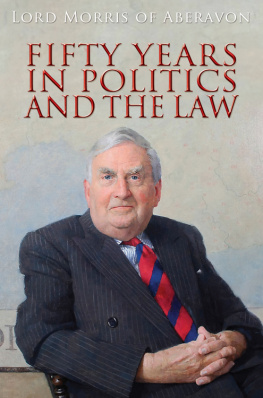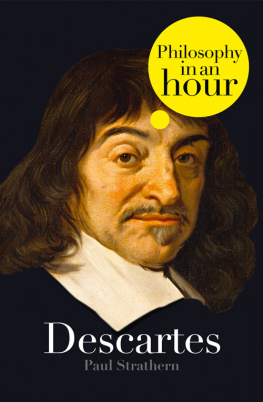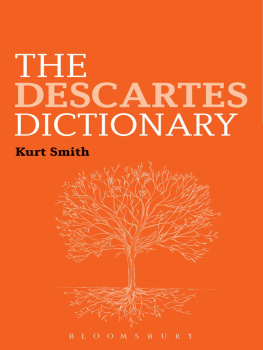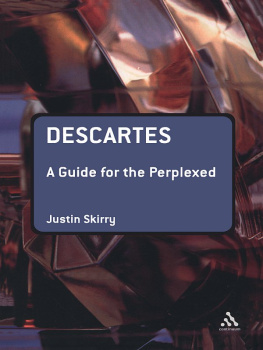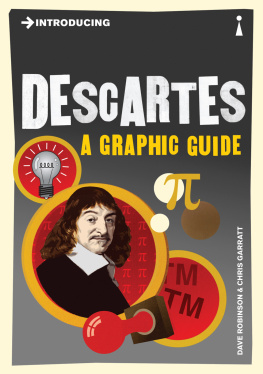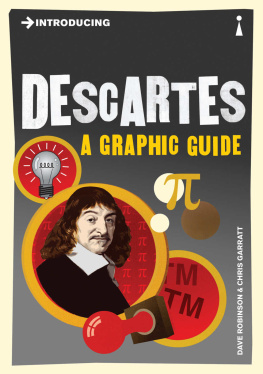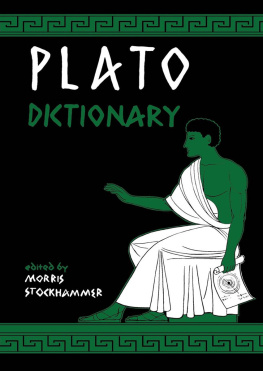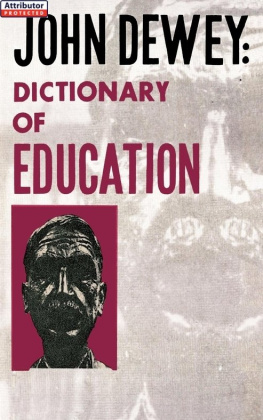John M. Morris - Descartes Dictionary
Here you can read online John M. Morris - Descartes Dictionary full text of the book (entire story) in english for free. Download pdf and epub, get meaning, cover and reviews about this ebook. year: 2022, publisher: OpenRoad, genre: Science. Description of the work, (preface) as well as reviews are available. Best literature library LitArk.com created for fans of good reading and offers a wide selection of genres:
Romance novel
Science fiction
Adventure
Detective
Science
History
Home and family
Prose
Art
Politics
Computer
Non-fiction
Religion
Business
Children
Humor
Choose a favorite category and find really read worthwhile books. Enjoy immersion in the world of imagination, feel the emotions of the characters or learn something new for yourself, make an fascinating discovery.
- Book:Descartes Dictionary
- Author:
- Publisher:OpenRoad
- Genre:
- Year:2022
- Rating:3 / 5
- Favourites:Add to favourites
- Your mark:
- 60
- 1
- 2
- 3
- 4
- 5
Descartes Dictionary: summary, description and annotation
We offer to read an annotation, description, summary or preface (depends on what the author of the book "Descartes Dictionary" wrote himself). If you haven't found the necessary information about the book — write in the comments, we will try to find it.
Descartes Dictionary — read online for free the complete book (whole text) full work
Below is the text of the book, divided by pages. System saving the place of the last page read, allows you to conveniently read the book "Descartes Dictionary" online for free, without having to search again every time where you left off. Put a bookmark, and you can go to the page where you finished reading at any time.
Font size:
Interval:
Bookmark:



John M. Morris
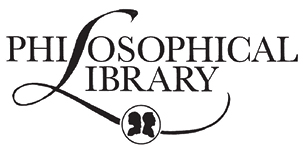

The purpose of this Descartes Dictionary is to bring together as many as possible of the technical and special terms in Descartes writings with their definitions in Descartes own words. Not all of the entries are explicit definitions, although most of them are; there are also implicit characterizations of the meanings of many words, and a handful of entries were included simply for their own sakebecause Descartes had something interesting to say about his life and world.
All of the entries, or almost all of them, have been newly translated for this volume. (The exceptions are a half-dozen of the passages in the Rules and most of the Notes against a Program , which were taken from the Haldane-Ross translation.) There are many reasons for preparing new translations: The language in the older translations is archaic and often inaccurate; many of Descartes most important works have never been translated into English; and modern translations vary in quality and style. What is most important, though, is just that the old Haldane-Ross translation simply failed to pay attention to the technical language that Descartes used, and so blurred some of the most important distinctions that he made. To cite just one example (one of the most glaring ones), on two pages of the Haldane-Ross translation, various forms of the French word connaissance are given six different translations into English: recognize, understand, knowledge, cognizance, apprehend, and comprehend (pp. 92-93). The English-speaking reader has no way of telling that this assortment of words all refers back to the same French (and Latin) conceptknowledge by acquaintance or recognition.
The translations used here, then, are specifically intended to throw some light on Descartes own vocabulary, and they are as literal as it was possible to make them, without sacrificing readability. The French versions of the Meditations and the Principles of Philosophy were used, rather than the Latin, because Descartes himself revised and approved these translations, and some of the changes that he made are significant.
None of the passages has been condensed, but many of them appear as parts of longer sentences. Leading words have often been deleted, and the endings of many of Descartes long sentences have been omitted. Sometimes a word or two has been added, to make a passage more intelligible; these additions are enclosed in brackets.
Following each listing, the source from which it was drawn is named, together with the section number, if it has one. Then follow the volume and page numbers of the standard Adam and Tannery edition of the works of Descartes (except for a few passages from works that do not appear in the AT edition).
Students using this dictionary will find that it gives some needed clarifications of the terms that Descartes introduces into his writings without explanationterms like animal spirits, common notions, natural light , and so onand for which he gives definitions or explanations only in his letters, or in some obscure, unpublished work. Of course use of the dictionary is no substitute for a close study of the texts themselves; all of these brief passages are wrenched from their context, and many of them can be misleading (or unintelligible) without some understanding of the purposes that they serve in the Cartesian system, a system that depends heavily upon method and order. But for someone who has accepted Descartes invitation to spend some weeks or months in meditation with him upon the basis of human knowledge and the search for truth, the dictionary may provide some assistance.
Finally, many of the entries were included specifically for the general reader, who would like to hear some of the things that Descartes had to say about people and the world. A gentleman soldier himself, he wrote to men of the world, and to a queen and a princess, attempting to show that his philosophical method applied to practical affairs.
My thanks to Theresa McCracken and Kathy Morris for alphabetizing the entries, and, not infrequently, for correcting my spelling.
J OHN M. M ORRIS
1596 Birth of Descartes at La Haye.
1606 Enters college at La Flche.
1614 Leaves La Flche, studies law at Poitiers.
1616 Graduates from Poitiers.
1618 Soldier under Maurice of Orange. Compendium Musicae (unpublished).
1619 Nov. 10: Dreams mark turning-point in vocation.
1620 Travels in Europe. Cogitationes Privatae, Olympica (unpublished).
1628 Rules for the Direction of the Mind (uncompleted, unpublished).
1633 Condemnation of Galileo. The World and Treatise on Man prepared for publication but withdrawn.
1637 Discourse on Method, Dioptrics, Geometry, Meteorology , first published work.
1640 Death of Descartes daughter and father.
1641 Meditations , with Objections , and Replies .
1644 Principles of Philosophy .
1645 Search for Truth (unpublished, date uncertain).
1647 Notes against a Program published without Descartes permission. Discourse on the Human Body (unfinished, unpublished, as were other anatomical works).
1648 Interview with Burman.
1649 Passions of the Soul published. Birth of Peace , a ballet on the Peace of Westphalia written for the Queen of Sweden.
1650 Death of Descartes in Sweden.
Philosophical Works of Descartes , Elizabeth S. Haldane and G. R. T. Ross, translators, New York, Dover Publications, 1955, (reprint of 1931 edition).
Rules for the Direction of the Mind , Laurence J. Lafleur, translator, Indianapolis, Bobbs-Merrill, 1961.
Discourse, Optics, Geometry, Meteorology , Paul J. Olscamp, translator, Indianapolis, Bobbs-Merrill, 1965.
(The Discourse and the Meditations are available in many modern translations.)
Descartes: Philosophical Letters , Anthony Kenny, translator, Oxford, Clarendon Press, 1970.
Volume and page references following each entry refer to the standard edition of Descartes works, Oeuvres de Descartes , edited by Charles Adam & Paul Tannery, Paris, Cerf, 1897-1913; 13 vols. Reprinted in part, with corrections, Vrin, 1957
Additional selections were taken from Descartes: Oeuvres Philosophiques , Ferdinand Alqui, editor, Paris, Garnier, 1963- ; 3 vols.
Birth of Peace appears in Un Ballet de Descartes, by Albert Thibaudet and Johan Nordstrm, Revue de Genve , vol. I (1920), pp. 163-185.
ABSOLUTE
I call absolute everything which contains in itself, in the pure and simple state, the nature with which we are concerned: such as everything which is considered as independent, cause, simple, universal, one, equal, similar, straight, or orther qualities like this; and I apply the term absolute to the simplest and easiest, because of the use that we make of it in the resolution of our questions.
Rules, VI. X, 381-382

Font size:
Interval:
Bookmark:
Similar books «Descartes Dictionary»
Look at similar books to Descartes Dictionary. We have selected literature similar in name and meaning in the hope of providing readers with more options to find new, interesting, not yet read works.
Discussion, reviews of the book Descartes Dictionary and just readers' own opinions. Leave your comments, write what you think about the work, its meaning or the main characters. Specify what exactly you liked and what you didn't like, and why you think so.

